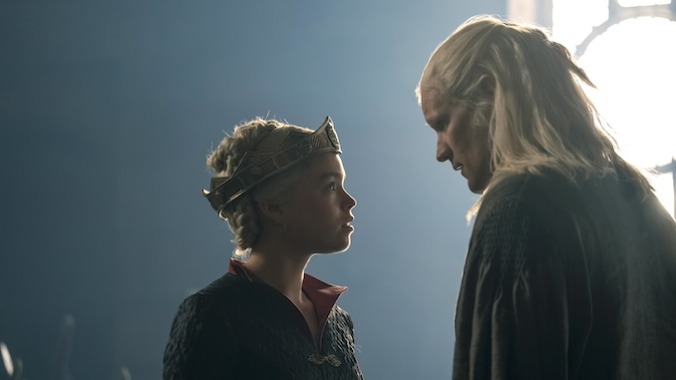On House of the Dragon, Rhaenyra Has Always Been Daemon’s Means to an End
With Daemon's intentions now plainly stated, Episode 5 finally sets the stage for Rhaenyra to reclaim her agency, both within her war room and in the season's overarching storyline.
Photo Courtesy of HBO

In the most recent episode of HBO’s House of the Dragon, Daemon (Matt Smith) finally put plainly the intention that’s been lingering in the background of all his scenes since the very first episode of Season 1: when King’s Landing is up for grabs, he intends to be the one to take it, expecting Rhaenyra (Emma D’Arcy) to fall in line next to him. While some viewers have taken to social media to express their belief that these actions are completely out of character for “wife guy” Daemon Targaryen, this intention becoming textual culminates his arc as one of the series’ most conniving characters, and further highlights House of the Dragon’s commentary on gender in this society.
Since Season 1 of this Game of Thrones prequel, Daemon’s quest for power and dominance has been abundantly clear. From the actions he employed as commander of the City Watch to his constant grooming and manipulation of Rhaenyra, his primary motivation throughout the entire series has been to spit in the face of the brother who refused to make him heir as he attempts to forcibly take that power for himself. His movements across this chessboard have always positioned him as an opportunist, and that quality is what defines the relationship he shares with Rhaenyra in particular, especially as she grows from a child into a woman throughout the series.
While Daemon and Rhaenyra dance around each other during Season 1’s pre-time jump setting, the tension and attraction finally comes to a head when Daemon takes his young niece to a brothel in King’s Landing, insisting that she experience something beyond the walls of the Red Keep for once—with his guidance, of course. When the two finally share a kiss in the middle of the brothel, Daemon indulges Rhaenyra until he finally pulls away, denying her the “pleasure” he insisted she witness with her own eyes. In doing so, he’s set his trap: he sought to ensnare Rhaenyra, to make her chase after his admiration for the rest of her life. By making his attention a challenge in that moment, Daemon sets a plan in motion that he’ll reap years down the line. Because even after Viserys (Paddy Considine) denies his plea to wed a now “sullied” Rhaenyra to him—Daemon insists that he will accept her “as she is,” like she’s a TV someone posted on Facebook Marketplace—he settles in to play the long game instead. He travels back to the Vale, where he kills his current wife and waits patiently for Rhaenyra to come running back to him, denying her his presence for nearly a decade so that she’s just as eager to leap into his arms as he expects.
And Rhaenyra does. Upon their first meeting in years, Rhaenyra and Daemon consummate their relationship on the beach at Driftmark while Rhaenyra’s husband, Laenor (John Macmillan), mourns the loss of his sister (and Daemon’s second wife), Laena (Nanna Blondell). Rhaenyra insists that she needs Daemon by her side because her claim would not be so easily challenged if she were to wed within her house, and while that may be true, it also plays right into Daemon’s hand. From the moment Viserys affirmed Rhaenyra’s claim to the throne, Daemon consistently ensured his niece saw him not only as a beacon of strength, but as an ally who would be in constant support of her actions; playing the cool uncle to Viserys’ overbearing father. And it’s with that influence that Rhaenyra marches headlong into her own undoing—at least in Daemon’s eyes. He has crafted, groomed, himself a scared little girl trapped in a ruler’s body, believing that she needs the gentle hand of her uncle-husband at her back to make any and all decisions.
-

-

-

-

- Curated Home Page Articles By Test Admin October 21, 2025 | 3:10pm
-

- Curated Home Page Articles By Test Admin October 21, 2025 | 2:57pm
- Urls By Test Admin October 21, 2025 | 2:57pm
- Curated Home Page Articles By Test Admin October 21, 2025 | 2:55pm
-

-

-

-

-

-

-

-

-

-

-

-

-

-

-

-

-

-

-

-

-

-

-

-

-

-

-

-

-

-

-




































